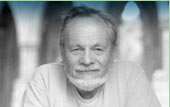The current climate crisis isn’t the first time human beings have faced global climate change. Extreme weather, ice sheets melting into the Arctic ocean, and mega-droughts lasting a century or more: it all happened before, between the tenth and the fifteenth centuries. The global warming of the Middle Ages changed civilization, bringing both great disorder and great opportunity.
The audio for this episode is available upon request for a donation of $4.99 to Writers Voice. Contact writersvoice [at] wmua.org.
 Host Francesca Rheannon talks with author, archeologist and anthropologist Brian Fagan. He says we can learn much from that Great Medieval Warming. We can draw lessons from its winners, like the Mongols who adapted to the changes, as well as from its losers, like the Maya, who didn’t. Fagan has written extensively about how climate affects the course of human history. His books include THE LONG SUMMER, THE LITTLE ICE AGE and now, THE GREAT WARMING.
Host Francesca Rheannon talks with author, archeologist and anthropologist Brian Fagan. He says we can learn much from that Great Medieval Warming. We can draw lessons from its winners, like the Mongols who adapted to the changes, as well as from its losers, like the Maya, who didn’t. Fagan has written extensively about how climate affects the course of human history. His books include THE LONG SUMMER, THE LITTLE ICE AGE and now, THE GREAT WARMING.
Read excerpts from THE GREAT WARMING.
Some recent polls suggest that in a time of high oil prices, people are losing interest in climate change. They want the price at the pump to come down. Rather than investing in clean energy like solar or wind, they want more drilling for more oil. And the assumption that we can’t afford to make the transition to renewable fuels is rife.
Rheannon’s second guest, George Monbiot, says that’s a false assumption. Earlier this month, he wrote on his blog Monbiot.com there is no cheap alternative to a green economy. And the famous 2006 Stern Review on the Economics of Climate Change said that while going green will cost an estimated 1% of the world’s GDP, not doing so would cost as much as 20% of GDP.
Monbiot’s book HEAT, HOW TO STOP THE PLANET FROM BURNING is an essential guide to clear thinking about the climate crisis and solutions. In this abridged version of our interview last year, Monbiot talks about the kind of economic sticks and carrots that could end up not only saving us all a lot of money, but the planet, as well. I was joined on the interview by Bill Baue. He’s my colleague on Corporate Watchdog Radio, a weekly radio show and podcast about corporations, sustainability and human rights.

2 thoughts on “Climate Change, Past, Present and Future”
Comments are closed.